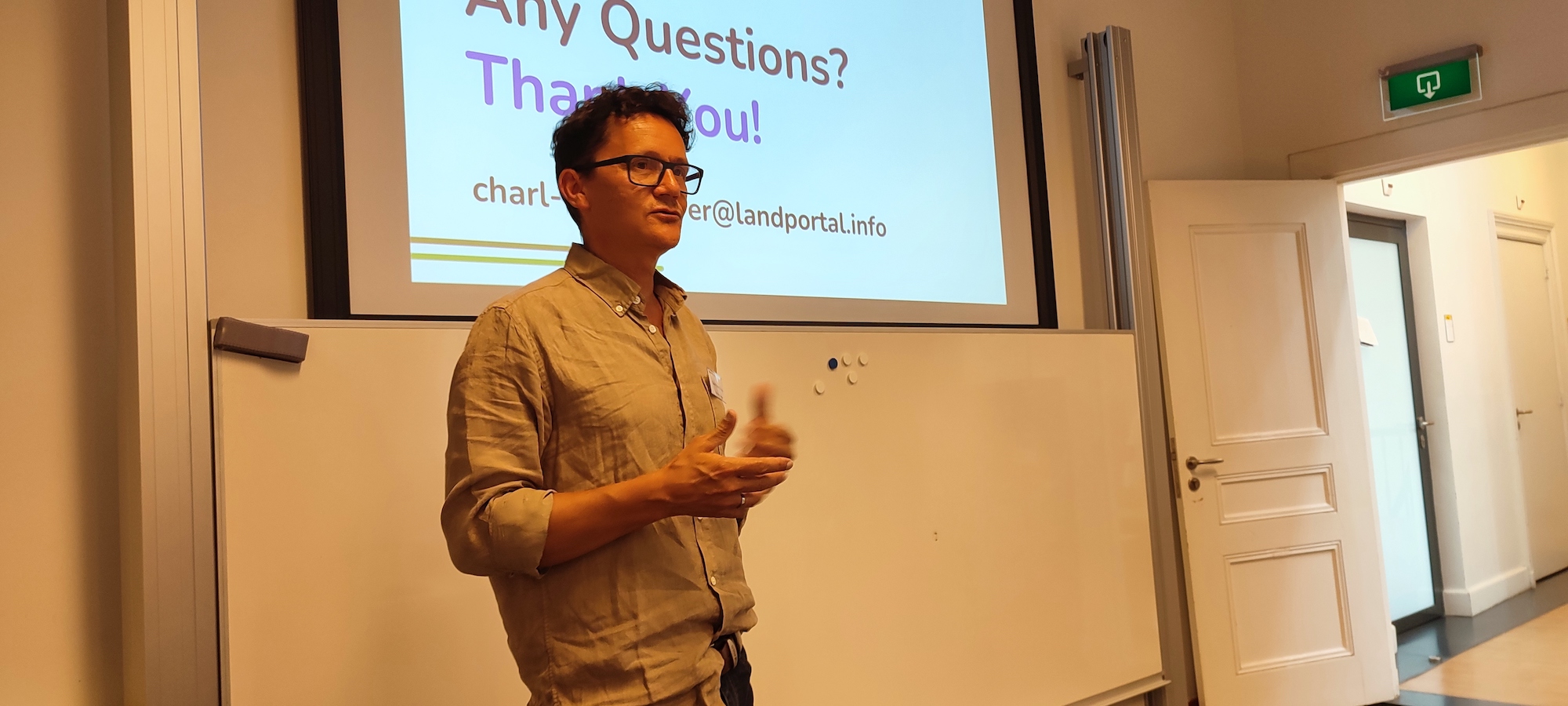At the Land Portal Foundation, we advocate for open land data and recognize the importance of land data in driving progress in support of sustainable development. We aim to engage stakeholders and develop supportive measures to advocate for the increased accessibility of land information and support capacity building in this regard. The current challenge we face is the inaccessibility of poorly managed land data, often limited to localized sources and overshadowed by information from large organizations. We emphasize the need to make information more available and accessible at the country level.
We highlight that information is not only a fundamental right but also a key enabler of other rights. Access to information is not a luxury, or secondary consideration, but is foundational to achieving good land governance and access to services such as water, sanitation, and nutrition. Access to information is a core issue in the Sustainable Development Goals (SDGs) and is a fundamental right under the African Charter on Human and Peoples Rights. The African Union drafted a model law on access to information to guide member countries in adopting legal frameworks to expand protection of the right to information.
The Land Portal is developing the State of Land Information Index (SOLIndex), to track the openness of land data globally. We aim to make the results actionable by providing a benchmark and diagnostic tool for countries to improve the accessibility of land information. We have also developed the Open Up Guide on land governance to support actions in opening information. We seek to complement existing initiatives that monitor data, such as the SDG Tracker and the Global Data Barometer's Land Module. We recognize the importance of ethics, equity, and inclusion when discussing data, as data itself may be neutral, but the use and deployment of information is ultimately part of political and governance processes.
The SOLIndex uses a framework for land data based on land administration functions and the need for services related to land. It is premised on the nexus between land administration, open data and land data under a human rights framework approach to developing indicators. The focus is on assessing the openness and accessibility of land data by understanding the availability of public sector information and evaluating its openness in order to provide globally comparable indicators. The goal is to differentiate between data that is public but not truly open, such as information embedded in PDF reports. The methodology allows for data updates and aims to promote engagement. Four core data categories are identified: tenure data, land use data, land value data, and land development data. We acknowledge that not all categories apply to every country. We have developed ten criteria for open data, including online accessibility, metadata standards, bulk download options, and machine-readable licenses.
The SOLIndex aims to support transparency, improve decision-making, and provide a diagnostic tool for policymakers, land data custodians, researchers, and practitioners. The index focuses on key questions such as the amount of online data available and its inclusiveness. It examines different categories of land data, including land tenure data, communal land and indigenous lands. The index also considers whether the data is gender-disaggregated and emphasizes the importance of data inclusiveness. The results of the index can be used for lobbying, advocacy, and understanding the openness of land data globally against well-defined benchmarks. At the country level, the index enables a deeper analysis of specific land data, including its technical characteristics, interoperability and potential barriers to improve access.
Through the SOLIndex, we aim to complement existing knowledge and indicators rather than duplicate them. We have engaged with organizations like the International Land Coalition, Transparency International and the Global Data Barometer to ensure alignment and complementarity.
We plan to conduct a pilot project in about 17 countries by the end of this year and expand to include more than 100 countries by 2025. We are actively forming partnerships with entities such as the Land Matrix, Prindex, LANDex, the FAO and the Global Data Barometer to build a broad alliance for the indicator's use and adoption.
Initial results from completed work in pilot countries show positive trends, particularly in Africa. Over 50% of African countries have passed access to information laws, with an additional eight countries currently in the process of enacting such legislation. This demonstrates a growing recognition among governments that access to information is a fundamental issue that needs to be addressed. Furthermore, 36 countries have data protection laws, indicating a focus on privacy and security.
The presence of access to information legislation correlates with better results in terms of openness, but it's not a linear relationship. Some countries without specific legislation have made progress in opening land data based on pre-existing policies or regulations. Leadership in this regard extends beyond individual countries, with pan-African institutions like the African Development Bank adopting open access to information policies for internal fulfillment of their mission. Regarding specific data categories, legal and policy data (bibliographic) tend to be more open and well-developed, while land tenure and land development data have limited availability. However, it's worth noting that often more data exists in countries than is initially thought when starting the research.
Overall, the preliminary findings suggest both areas of improvement and untapped potential for data availability. The SOLIndex aims to provide a comprehensive picture of land data openness worldwide, aiding decision-making, promoting transparency, and facilitating targeted interventions to enhance data accessibility and interoperability.
This is a summary of Charl-Thom Bayer's presentation at the IOS-Fair Transitions-LANDac International Conference 2023. Charl-Thom Bayer is a Land Information Management Specialist at the Land Portal Foundation.

